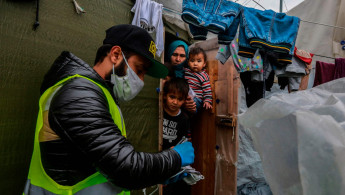Coronavirus could spread faster in crowded refugee camps than it has on cruise ships: NGO
The novel coronavirus could spread faster in overcrowded refugee and displaced persons camps than it has anywhere else so far, including on cruise ships, an aid group warned Wednesday.
The International Rescue Committee said its analysis showed that COVID-19 transmission rates in some of the worst camps on the globes could outpace that witnessed during the dramatic quarantine of the Diamond Princess cruise ship off the coast of Japan.
"Refugees and displaced people in camps in Syria, Greece and Bangladesh face a heightened risk of COVID-19 due to living conditions that are even more cramped and densely populated than the Diamond Princess," IRC said.
It said transmission of the virus on the cruise ship, where 712 passengers contracted the virus during a two-month quarantine in Yokohama, was four times faster than at the peak of the outbreak in China's Wuhan province, where the virus originated.
"The rapid spread of COVID-19 on the Diamond Princess showed how the virus thrives in confined spaces but for millions of displaced people their conditions are far more cramped and poorly serviced and the risks are far deadlier," IRC's Marcus Skinner said.
The NGO, which was founded in the US in 1933 at the suggestion of Albert Einstein, cited three camps in three countries where population density is higher than the ratio of 24,400 people per square kilometre on the Diamond Princess:
|
- Cox's Bazar, a Bangladesh port with a large population of Rohingya refugees (a ratio of 40,000 people / square kilometre)
- Al-Hol, a camp in northeastern Syria housing families of Islamic State jihadists (ratio of 37,570 people / square kilometre)
- Moria, a camp for some 20,000 people on the Greek island of Lesbos (ratio of 203,800 people / square kilometre)
Marcus Skinner said that, provided adequate funding came forward, some measures could be taken to mitigate the risk in those overcrowded camps.
Read also: For Middle East refugees, social distancing is a privilege few can afford
He cited increasing access to running water, identifying isolation areas, redesigning and building new shelters to support social distancing.
The COVID-19 pandemic has killed more than 40,000 people worldwide since the virus first appeared in China late last year.





 Follow the Middle East's top stories in English at The New Arab on Google News
Follow the Middle East's top stories in English at The New Arab on Google News
![Netanyahu furiously denounced the ICC [Getty]](/sites/default/files/styles/image_330x185/public/2024-11/GettyImages-2169352575.jpg?h=199d8c1f&itok=-vRiruf5)
![Both Hamas and the Palestinian Authority welcomed the ICC arrest warrants [Getty]](/sites/default/files/styles/image_330x185/public/2024-11/GettyImages-2178351173.jpg?h=199d8c1f&itok=TV858iVg)
